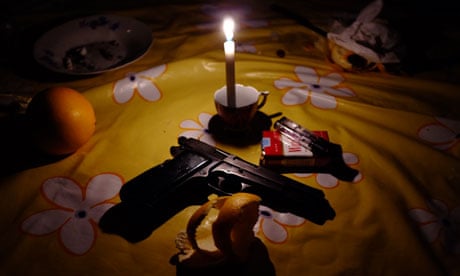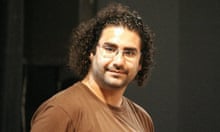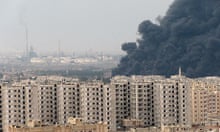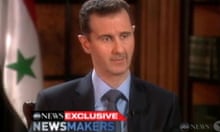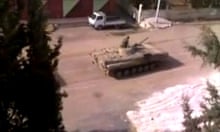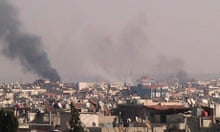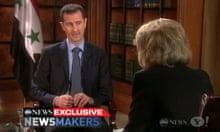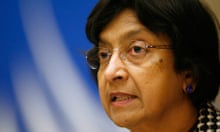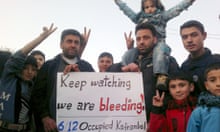Twice the army had come to Benish. On the first occasion they arrested more than 70 people, demonstrators, old and young. The lucky ones were released after two months. Some are still missing. On the second occasion the people fought back, with hunting rifles, old guns, stones even. When the security forces withdrew there were 21 dead: 11 demonstrators and 10 pro-regime fighters.
The people had won their liberty, temporarily at least. Buildings were covered with anti-regime slogans. "Benish is free," reads graffiti scrawled with red paint on a whitewashed town wall. In the middle of the market square is a huge revolutionary flag in green and black and adorned with three red stars: it is the old Syrian flag, the one that predates the Assads.
But this freedom is precarious. The security forces are gathering once again at the town's margins. Today, as in other hotspots in Syria's nine-month uprising, this is a town under siege, surrounded by tanks and roadblocks manned by the army, police and pro-regime militias.
This menacing array does not dampen the revolutionary fervour. By night crowds gather in the town centre. More than 100 men stand in rows waving their hands and chanting.
A man called Hamza, who before the revolution sold gas canisters, had converted his wagon into a jury-rigged mobile broadcasting unit with two megaphones.
He stood next to it, reading out slogans directed against the regime of the president, Bashar al-Assad, from a piece of paper.
"Ya Bashar. Ya Bashar. Ya Bashar must leave."
The crowd swung with rhythm and shouted back: "Ya Bashar must leave!"
A cheerful young man danced in the middle of the crowd, a big drum strapped to his shoulder. "I am the Viagra of the revolution," he said. "I make the people rise and dance." He beat his drum to the rhythm of the chant and the people danced, waved and lit candles. We walked away from the square with a man named Ahmad. "Every time I say 'down with the regime!' or 'Bashar get out!' I feel I have regained a bit of my dignity," he said. "I tell you, I have never before had dignity in this country."
Anxiety
The peace of the following morning was shattered by Hamza, who drove around town with his megaphones blaring: "People of Benish, the army is here. All men to your positions. Allahu Akbar! The army has surrounded the town. All men to your positions."
As before previous assaults, the regime had cut all communications in the night. Landlines, mobiles and internet were down, so Hamza and his wagon was the only means of spreading the news. His voice swept through the rubbish-strewn streets and alleyways. He followed his announcements with revolutionary songs and anti-Assad chants.
Within minutes the town was up and ready to fight. Young men who had been snoring heavily under thick blankets sprung to their feet, shook the sleep from their heads and grabbed their guns.
Flocks of children in pink and blue uniforms on their way to school abruptly turned around and walked back to their homes in single file accompanied by jittery mothers in colourful scarves and long black gowns. Scooters, tractors and cars ferried fighters into the town centre.
We hurried to the square with Mustafa, a chubby, red-headed 26-year-old. He had a Kalashnikov with two magazines of bullets strapped together and a black plastic bag filled with more bullets. His mother stood silently at the entrance of the family house watching him walk away.
Did he think his weapon had a chance against the tanks? "No," he said, his eyes fixed on the street ahead. "Am I afraid? Yes, I would be lying if I told you I was not. I am scared that I will see something horrible happening to my father, or brother or uncle. "I am scared that I will fall into their hands. I was arrested three times.
"I was beaten and tortured for months. I can't go through that again. I will die a hundred deaths, but I won't be arrested again."
There were dozens of men in the potholed market square now. They carried old Kalashnikovs, hunting rifles and pistols. Ammunition was in short supply.
Mustafa, who had been buying and hoarding bullets for weeks, scooped a handful of them from his black plastic bag to give to the men who had none.
At one end of the square stalls were still selling grilled meat, sending up thick blue smoke that mingled with the dust and fumes kicked up by motorbikes and lorries.
Children surrounded the fighters and chanted songs that mocked Assad, but the fear and anxiety was palpable.
Underneath the freedom flag, in a glass and aluminium box, were the pictures of the 11 young men who had been killed in the previous army raid. They stared sternly at the men gathered underneath.
Muhammad al-Sayed, a tall wide-shouldered man with a barrel chest who was the head of the Benish security committee, grabbed the microphone from Hamza's wagon.
The town was still experimenting with democracy and all decisions were taken in caucus-like meetings. There were no leaders and no commanders but village volunteers.
"All Free Syrian Army fighters stand on one side," Muhammad said. "Schoolchildren on the other."
Two separate groups formed from the gathered men and boys, but they soon mingled again.
A group of fighters gathered around Muhammad to discuss strategy.
"We should all head to Taftanaz," one man said, referring to a neighbouring town in the line of fire.
"What if we are crushed there?" said another. "They will come into Benish without any resistance."
"We should go to our checkpoints and wait," said a third man.
"All men get back to your checkpoints and positions," Muhammad declared from the microphone.
"No, no," said another man, who was carrying an American rifle. "We have to split into fighting groups of three to four men and disperse through the city so if they come we can attack and ambush them."
The other men nodded and Muhammad told the men to form into small units and separate.
They left the square on motorbikes and in cars.
The teenagers meanwhile marched down the street, chanting: "The people want to execute the president."
Vases
I walked with a fighter named Muhyo through the tiny alleyways towards the eastern edge of the town where we were told the army's tanks and trucks were gathering. Men on motorbikes with guns slung over their shoulders passed us on their way to the front.
We climbed up to the roof of a building to get a view of the fighting.
Benish stands on a small hill surrounded by open countryside, but an early morning haze had settled on the olive orchards and barley fields surrounding the town and no one could really see where the army was. A few bursts of distant gunfire seemed to indicate that the battle had already started in Taftanaz. "We need to place vases on the roads," Muhyo said to the man standing next to him. "How many vases do you have?"
"Vases," it transpired later, were rudimentary improvised explosive devices (IEDs) made from empty gas canisters filled with fertiliser, with a detonator placed inside that could be connected via wires to a car battery.
"I have two ready," replied the man.
Muhyo directed that they should be placed on each of the two roads that led out of town towards Taftanaz, and wires and duct tape were ordered.
A young boy, who had just brought a breakfast tray of stale bread, oil, dried thyme, olives and a pot of sweet tea, went off to get them.
The men dipped the bread in the olive oil and then smothered it with thyme. When the young boy came back with two bundles of black wires we went down to the street to place the explosives.
Muhyo and the man with the vases placed the first gas canister on the side of the road and covered it with few sheets of plastic and garbage. Muhyo started building a roadblock to force the convoy to move next to the IED.
People came out of their houses to help. Children helped Muhyo carry rocks while their mothers watched on from the doorways of their houses.
Two young men brought old tyres, placed them around the roadblock and set them on fire to create a smokescreen to cover the IED. The sound of shooting was getting closer.
"I need a pair of pliers," shouted the man still stripping the wires with his mouth. A boy came running from a neighbouring house with his father's toolkit.
The cables were laid for 200 metres to a battery which was placed behind a high wall.
"When you see the convoy you attach the wires to the battery," Muhyo said. "Do you understand?"
"Yes," replied the man. His voice was calm but his hands were shaking.
"How will I see them?" he asked.
"I will watch for you," said a 12-year-old boy. "I will stand on the rooftop over there."
"Afterwards, you will have to run as fast as possible," Muhyo told him. "Just wiggle your way through the alleyways."
Then we followed Muhyo to the other road to place the second vase.
Around 50 fighters were congregated there, only half of them had guns, and very few had any ammunition.
People brought boxes of biscuits and put them on the ground for the fighters to eat.
The shooting was louder still. The men encouraged each other, shouted, waved their fists and formed a convoy of a few cars to attack the army positions. A handful of fighters piled on the back of two pickup trucks and filled one Toyota. Their faces were sullen and ghost-white with fear.
A few minutes later they were back. The machine gun, they said – the only one in town – was jammed.
With the same anxious faces, chants of "Allahu Akbar" and fist waving, they headed to the battle. In 10 minutes they were back again.
This time a man blocked the road with his truck, placing it in front of the retreating fighters.
His face was red as he screamed at the men: "You can't retreat. We die but we can't retreat!"
A crowd of fighters gathered around him. There was a scuffle and another fighter jumped on top of his car, shouted at him and cocked his gun, whereupon the man collapsed and started weeping.
Another convoy moved, and Muhyo and I joined them. We drove past the IED into the outskirts of Taftanaz, where other fighters were positioned.
A few of them had spread a blanket on the ground and were drinking tea. They looked like a happy family having a picnic in the countryside. Smoke was rising from a building ahead of us and the sound of heavy machine-gun fire came from up the road.
One of the fighters pointed at a small black dot moving in the distance. "A tank," he whispered.
The tank was on the parallel road and it appeared to be moving to cut off the rebels from the rear. All but a few of the fighters jumped into their cars and hurried back towards the outskirts of Benish, where they congregated again, waving fists and smoking and making plans for a counterattack.
An hour later the corpses of two men who had been brave enough to face a tank with Kalashnikovs were brought back. The fighters parted as their bodies were taken and placed in the mosque.
At sunset the army's fighters withdrew to their base at an airport a few miles down the road.
Civil war
That night Muhammad, the head of the security committee, sat with his friends and relatives around a stove. He described how, when the revolution began in Benish, the regime had asked him as a town elder to help stop it.
"When the young people first went out to demonstrate, the head of political security called me and said: 'Go and calm the street.'
"I went to the kids and asked them why they were demonstrating? 'We want freedom,' they said. 'In which bazaar is this freedom sold?' I asked. 'Tell me and I will go get it for you.' "
At first, Muhammad was against the demonstrations. "No one could imagine the people would demonstrate against this regime," he said. "We have seen the horrors of the 80s.
"We still have people missing who were detained by security forces then and haven't been heard of since."
It was a few days later, he said, that the security forces raided the town and took away more than 70 people.
"They realised that this regime doesn't distinguish between those who demonstrate or not," said Muhammad. "In the first demonstration they had called for freedom.
"In the following demonstrations they started calling for the toppling of the regime and removed all the pictures of the president from all public buildings ."
An old man interjected, shouting from across the room: "If you are insulted, what's left in your life?"
Mustafa, the young red-headed man, had been detained three times by different branches of the intelligence services.
After the initial beating, he said, they had forced his legs and arms through a tyre and hung him up so they could hit him, mainly in his genitals.
When he lost consciousness they put him in a cell where about another 100 men were detained. It was so crowded there was no space to lie down or sit.
"In the end I was willing to confess anything," said Mustafa. "I told the officer: 'Sir, I have blown up tanks, I have weapons and airplanes. Anything. Just stop the torture.'"
The only acceptable solution to the crisis was for Assad to abdicate, Muhammad said. "The people will forgive him and he will save the people the spilling of the blood.
"Otherwise, if this fighting continues we are heading for a civil war."
